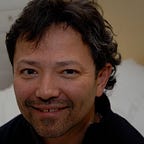Deleuzian Liberalism 1
The Liberal State as Evolutionary
Rawls’ reluctance to rely on transcendent principles is the strength of his liberal thought. It also provides us with a clue as to how Deleuze’s philosophy of difference could inform liberal theory.
In one sense, we can view Rawls’ work as a consistent extension of Deleuze’s philosophy, but in another broader sense we can extend Deleuze’s philosophy into the domain of liberal theory, and elaborate on what that might look like.
Deleuze and the Political
Paul Patton’s Deleuze and the Political is a book that attempts to do just that: explore how a Deleuzian perspective could transform liberal thought.
Patton begins by reminding us that Deleuze is a philosopher that understands concepts as historical problematics; attempts to elaborate on questions that arise in an historical context. And he goes on to suggest that the questions that have arisen in the canon of liberal theory have an historical nature as well: they evolve with history.
Patton identifies Deleuze as a philosopher of the pre-individual and his political thought as one of flows.
He then asks how we could understand liberal theory from a Deleuzian perspective, when historically, liberalism has relied on a concept of the individual.
A Normativity of Becoming
Patton asserts that there is a “normativity” in Deleuze’s thought and the overriding norm is deterritorialization.
Deleuze’s normativity is not one based in transcendence, but instead a fully immanent genetic process that can be understood both as a standpoint for critique as well as a perspective on creation.
Deterritorialization is the political normativity reflecting becoming, including the becoming of norms.
Patton suggests that concepts from liberal theory, such as the individual that is the bearer of rights and freedoms, can be interpreted from the perspective of Deleuze’s norm of deterritorialization; they can evolve historically.
The Affirmation of Life
More generally, one might propose that all of Deleuze’s thought reflects a norm of the affirmation of life.
Deleuze is a naturalist in the sense that only a philosophy that affirms life broadly considered is of any use to us.
Philosophies that judge life abstractly and in the negative can never be of any practical assistance or enlightenment.
Affirmation of difference-in-itself and repetition-for-itself, affirmation of the new and the open, affirmation of becoming, is a common norm running through all of Deleuze’s work, including the political thought contained Capitalism and Schizophrenia.
And deterritorialization is the political explication of the affirmation of becoming.
Becoming of the Liberal State
A Deleuzian liberal theory would indeed incorporate the notion of pre-individual flows that territorialize, deterritorialize and reterritorialize.
But we can go further. We can recast the primary question of liberalism as no longer the question of how might we be governed, but instead, the question of how society might be organized such that it promotes the creation of the new.
How might we organize our social and political institutions such that they embrace the becoming in us and our environment?
How might we understand freedom and equality and fairness in society not in terms of static rights or eternal values, but instead in terms of concepts or principles that support and promote becoming and change in society?
How might they be ordered in our political institutions such that they affirm life itself?
Becoming, affirmation of life, the creation of the new, in a sense runs throughout Rawls’ political thought.
The liberal political state itself is contingent in nature, not transcendent, and can only be defended, can only survive, if it affirms life; if it remains open to change and evolution.
The freedom to choose one’s own vision of the good is the affirmation of life, is deterritorializing of forces in society that would structure and arrange institutions such that one has no choice of their own concept of the good.
A political formation can only be defended insofar as it affirms the return of pure difference.
I hope you enjoyed this article. Thanks for reading!
Tomas
Please join my email list here or email me at tomas@tomasbyrne.com.
Excerpt from my forthcoming book, Becoming: A Life of Pure Difference (Gilles Deleuze and the Philosophy of the New) Copyright © 2021 by Tomas Byrne. Learn more here.
